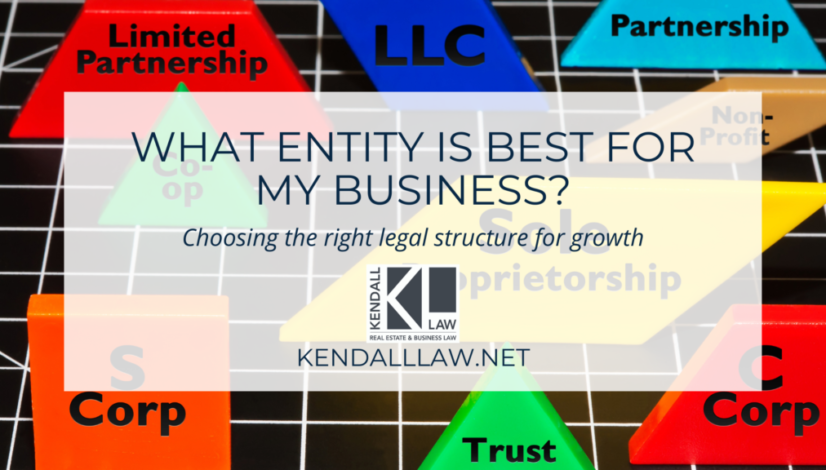What Entity is Best for My Business?
Written Contribution by Ryan Blaney
Unfortunately, there is no “one-size-fits-all” answer for the best business entity type, so let’s take a look at some of the most common types of business entities and what a business owner should know about each one.
The first step for choosing the right legal structure for your business is by analyzing the company’s goals and considering local, state and federal laws. As the business grows, it’s possible to change the legal structure and meet the business’s new needs.
Typically, If you want sole or primary control of the business and its activities, a sole proprietorship or an LLC might be the best choice for you.
Limited Liability Company – LLC
A limited liability company also known as an LLC is a hybrid structure that combines some of the advantages of sole proprietorships and partnerships with the liability protection of corporations.
The cost of forming an LLC will be higher than the Sole Proprietorship cost, but it is generally an easier process than forming a Corporation. The costs can range, depending on the state you filed in. For example, if you file an LLC in the state of New York, there’s a $200 State filing fee.
An advantage of LLCs is that owners enjoy pass-through taxation: meaning that LLC profits aren’t subject to corporate taxes and are treated as personal income of their owners. Another advantage is if you get into a dispute with a customer or contractor and they sue the company. The plaintiff in that suit cannot go after your personal assets should they win the case.
On the not so bright side, even though LLCs offer flexibility, all members of an LLC will have to pay their individual taxes on the company’s earnings.
Please note that service professionals in the State of California (i.e., Attorneys, Accountant’s) cannot have an LLC must rather choose to be a Professional Corporation.
Some large businesses choose this legal structure:
- Pepsi-Cola
- Sony
- Nike
- Hertz Rent-a-Car
- eBay
Corporation
A corporation in an entity separate from its owners in the eye of the law. It has its own legal rights, independent of its owners – it can sue, be sued, own and sell property, and sell the rights of ownership in the form of stocks. This means that creditors and customers can sue the corporation, but they cannot gain access to any personal assets of the officers or shareholders.
A corporation has a board of directors that makes the major decisions that guide the company. A single person can control a corporation, especially at its inception, but as it grows, so, too, does the need to operate it as a board-directed entity.
Corporation filing fees vary by state and fee category. There are several types of corporations, including C corporations, S corporations, B corporations.
- C corporations, owned by shareholders, are taxed as separate entities. Morgan Chase & Co. is a multinational investment bank and financial services holding company that’s listed as a C corporation. Since C corporations allow an unlimited number of investors, many larger companies, including Apple Inc., Bank of America, and Amazon, file for this tax status.
There’s no limit to the number of shareholders that can join a C Corporation. The company keeps existing if an owner leaves and the board of directors continues the corporation’s operation.
C Corps also offers tax benefits to owners and shareholders. You may pay taxes at a lower tax rate if your business income falls into a lower tax bracket.
Disadvantages: C Corps aren’t as easy to set up compared to other business structures. C Corps are also subject to double taxation. Double taxation occurs when the corporation pays a federal tax, and shareholders pay an individual tax for the corporation’s profits. - S corporations were designed for small businesses and avoid double taxation, much like partnerships or LLCs. Owners also have limited liability protection for shareholders and owners.
S Corps must:- Be a domestic corporation
- Have no more than 100 members
- Have only allowable shareholders, including individuals, certain trusts, and estates
- Have only one class of stock
- Not be an ineligible corporation, such as domestic, international sales corporations, certain financial institutions, and insurance companies.
-
B corporations, otherwise known as benefit corporations, are for-profit entities structured to make a positive impact on society. B corps are driven by both mission and profit. Shareholders hold the company accountable to produce some sort of public benefit in addition to a financial profit.
B corps are different from C corps in purpose, accountability, and transparency, but aren’t different in how they’re taxed.
Call us today if you would like to talk about setting up your own entity. Contact Kendall Law today or call (310) 619-4941.
Author: Ryan Blaney





